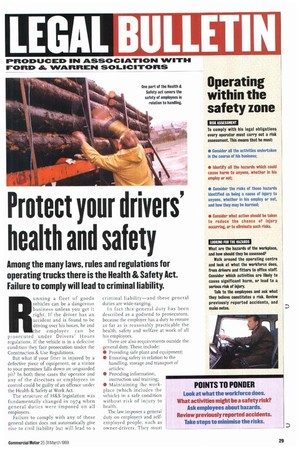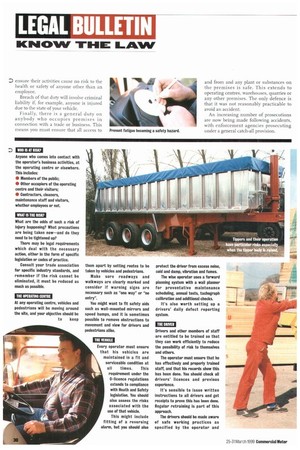Protect your drivers' health and safety
Page 31

Page 32

If you've noticed an error in this article please click here to report it so we can fix it.
Among the many laws, rules and regulations for operating trucks there is the Health & Safety Act. Failure to comply will lead to criminal liability.
Running a fleet of goods vehicles can be a dangerous business unless you get it right. If the driver has an accident and is found to be driving over his hours, he and the employer can be prosecuted under Drivers' Hours regulations. If the vehicle is in a defective condition they face prosecution under the Construction & Use Regulations.
But what if your fitter is injured by a defective piece of equipment, or a visitor to your premises falls down an unguarded pit? In both these cases the operator and any of the directors or employees in control could be guilty of an offence under the Health & Safety at Work Act.
The structure of H&S legislation was fundamentally changed in 1974 when general duties were imposed on all employers.
Failure to comply with any of these general duties does not automatically give rise to civil liability but will lead to a criminal liability—and these general duties are wide-ranging.
In fact this general duty has been described as a godsend to prosecutors, because the employer has a duty to ensure as far as is reasonably practicable the health, safety and welfare at work of all his employees.
There are also requirements outside the general duty. These include: • Providing safe plant and equipment; • Ensuring safety in relation to the handling, storage and transport of articles; • Providing information, instruction and training; • Maintaining the workplace (which includes the vehicle) in a safe condition without risk of injury to health.
The law imposes a general duty on employers and selfemployed people, such as owner-drivers. They must
D ensure their activities cause no risk to the health or safety of anyone other than an employee.
Breach of that duty will involve criminal liability if, for example, anyone is injured due to the state of your vehicle.
Finally, there is a general duty on anybody who occupies premises in connection with a trade or business. This means you must ensure that all access to
and from and any plant or substances on the premises is safe. This extends to operating centres, warehouses, quarries or any other premises. The only defence is that it was not reasonably practicable to avoid an accident.
An increasing number of prosecutions are now being made following accidents, with enforcement agencies prosecuting under a general catch-all provision.
















































































































